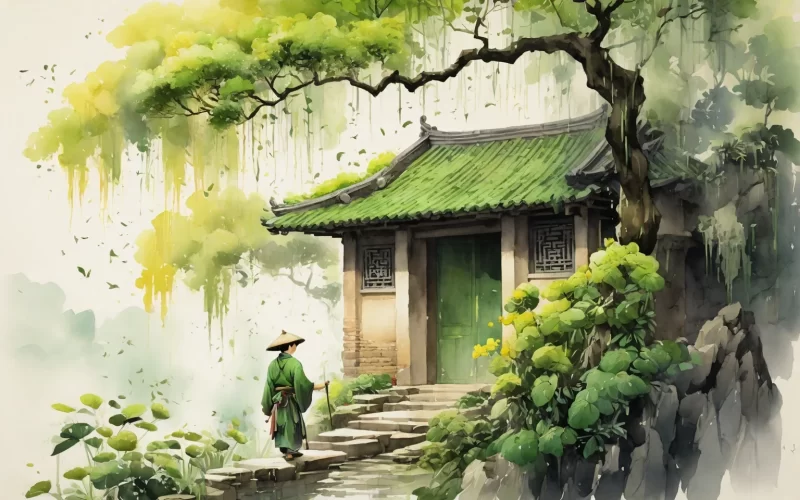You were foreordained to find the source. Now, tracing your way as in a dream There where the sea floats up the sky, You wane from the world in your fragile boat... The water and the moon are as calm as your faith, Fishes and dragons follow your chanting, And the eye still watches beyond the horizon The holy light of your single lantern.
Original Poem
《送僧归日本》
上国随缘住,来途若梦行。
浮天沧海远,去世法舟轻。
水月通禅寂,鱼龙听梵声。
惟怜一灯影,万里眼中明。
Interpretation
This poem was composed in Chang'an during the Tang Dynasty, when China's national strength flourished as the center of East Asian cultural exchange, attracting many Japanese monks to study Buddhism and Chinese culture. In this work, poet Qian Qi bids farewell to a Japanese monk returning home, expressing sincere respect and reluctant parting. The poem depicts both the monk's transcendent state of practice and the poet's profound emotions regarding his friend's long journey to China and equally long return, suffused with deep Buddhist wisdom and genuine human warmth.
First Couplet: "上国随缘住,来途若梦行。"
Shàng guó suí yuán zhù, lái tú ruò mèng xíng.
"You dwelled in this noble land by karma's call, Your coming journey dreamlike through ocean's sprawl."
The opening describes the Japanese monk's karmic journey across seas to China for Buddhist practice. The understated portrayal of his difficult voyage and devout faith highlights his spiritual purity and religious devotion.
Second Couplet: "浮天沧海远,去世法舟轻。"
Fú tiān cāng hǎi yuǎn, qù shì fǎ zhōu qīng.
"Dharma boat floats through celestial sea so vast, Lightly departing worldly ties at last."
This couplet depicts the monk's return journey. While literally describing ocean travel, it metaphorically suggests spiritual transcendence - his effortless departure from worldly dust back to purity, reflecting the poet's reverence for his Buddhist nature.
Third Couplet: "水月通禅寂,鱼龙听梵声。"
Shuǐ yuè tōng chán jì, yú lóng tīng fàn shēng.
"Water-moon clarity channels Zen's quiet grace, Fish-dragons hush to hear your Sanskrit's trace."
Using imagery like "water-moon" and "fish-dragons," this verse portrays the monk's serene Zen mind and profound Dharma understanding. The natural world being moved by his chanting praises his virtue while creating solemn Zen atmosphere.
Fourth Couplet: "惟怜一灯影,万里眼中明。"
Wéi lián yī dēng yǐng, wàn lǐ yǎn zhōng míng.
"Cherished remains that single lamp's glow, Illuming myriad miles as we part below."
The closing verse focuses on the symbolic Dharma lamp - its light guiding the long journey while representing wisdom that enlightens both path and mind, conveying deep affection and admiration through restrained expression.
Holistic Appreciation
The poem's structure progresses clearly: the first two couplets describe the monk's study in China and return journey, while the latter two praise his spiritual cultivation. Buddhist imagery like "karma," "Dharma boat," "water-moon," "Sanskrit chants," and "single lamp" imbue the poem with Zen resonance, creating ethereal yet sacred atmosphere. The Japanese monk emerges as a holy, transcendent figure - in the poet's eyes, an exemplary Buddhist master surpassing mundane existence.
Beyond parting sorrow, the poem contains profound respect and admiration; beyond religious connotations, it harbors human warmth. The concluding image of "single lamp's glow" particularly illuminates the central theme, symbolizing Buddha's radiant wisdom and purified mind-state, subtly profound with endless resonance.
Artistic Merits
The poem's most striking feature is its abundant use of Buddhist terminology and Zen imagery, blending religious serenity with literary elegance. The language is concise yet suggestive, emotions restrained but deep, achieving luminous transcendence within ethereal realms. The poet's effortless diction shows perfect integration of literary cultivation and Buddhist knowledge. Particularly when praising his friend, natural and religious imagery convey meanings indirectly, avoiding straightforward statements to prolong emotional resonance.
Insights
This work transcends mere farewell poetry to become authentic documentation of Sino-Japanese cultural exchange. By extolling the Japanese monk's spiritual practice, the poet expresses reverence for ideal personality and Buddhist wisdom, reflecting profound religious and cultural connections between Tang China and Japan. Amid worldly chaos, the poem offers not only parting emotions but also serene, transcendent spiritual inspiration, prompting reflection on life's meaning and pursuit's direction.
Poem translator
Kiang Kanghu
Qian Qi (钱起, 722-780 A.D.) was a poet of the Tang Dynasty, Han nationality, and a native of Wuxing (now Huzhou City, Zhejiang Province), who was one of the “Ten Talents of the Dali” and the “Champion of the Ten Talents of the Dali”. In his early years, he was unsuccessful in several examinations, but finally he was admitted as a scholar in 751 AD.












